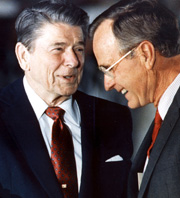To Choose a VP
John Moe
Angela Kim
AUGUST 16, 2008
- Ronald Reagan and George Bush, Sr.
- (LUKE FRAZZA/AFP/Getty Images)
Web Resources
Related Stories
- Spending the Stimulus Money
- Foreclosure Double Punch
- The End of Weekend America
- Conversations with America: Concluding the Conversation
More From John Moe
- Now you can draw state redistricting maps too
- The coming conundrum of home DNA testing
- What mattered this year in technology
More From Angela Kim
Barack Obama and John McCain each have a big decision to make: who to pick for a running mate.There's a lot at stake: in a close election, the right running mate could tilt the balance. And with Al Gore and then Dick Cheney, the VP's office has become a powerful one.
There have been months of deliberations, careful interviewing and vetting. It's an intensive process.
Well, sometimes the best way to understand the present is to contrast it with the past.
In 1980, everyone expected Ronald Reagan to name former President Gerald Ford as his running mate. It was in the bag. A sure thing.
But as Republicans gathered in Detroit for the GOP convention, a different name was announced: George Bush, Sr.
Why, at the 11th hour, was it Bush and not Ford? Richard V. Allen has some answers. He was Reagan's foreign policy adviser, and he was there.
John Moe: So it's 1980, it's just before the Republican Convention, where does the search for a vice president stand?
Richard Allen: Well, as far as the candidate Ronald Reagan is concerned, it's still very much in flux. He is in the process of meeting with several prospective vice presidents and had several meetings with Gerald Ford, but they were all sub rosa.
Moe: How's the vetting process? How is interview process working?
Allen: The process differs each time and, of course. In 1980, as orderly as we were-and very orderly we were indeed, already planning for a presidency in terms of policy initiatives-there was a lot of thought being given. But the Ford option seemed very attractive--having a former president, very popular, who had lost to Carter and had nearly lost to Reagan himself in 1976 when Reagan challenged him--come on board, seemed to be a dream ticket to some of the conventional party people.
Moe: What were Ford's powers going to be that were so different?
Allen: Well, it was dramatically different. It consisted primarily of all foreign policy and national security decisions resting with the office of the vice president. And in the office of the vice president there would be a person who would conduct foreign affairs without every having been confirmed by the Senate. His name was Henry A. Kissinger. And we would have a secretary of state that could be named by the president, but would be would be subject to the vice president's veto, and ditto the secretary of defense. If Ford had been nominated, I would have been gone the next morning, regardless of a four- year investment with helping Reagan.
Moe: Why was Reagan willing to go along with this deal?
Allen: Well, Reagan wasn't willing to go along with it, which is the whole point, isn't it? The negotiators were negotiating upstairs and trying to do a deal, and when Reagan described that to me, I decided that from my own perspective, I was going to do a Kamikaze crash on that ship.
Moe: And how did you do that?
Allen: Well, when Ford went on to Walter Cronkite's show, Cronkite said, "So you are considering a kind of co-presidency, is that it?" And Ford said, "Yes, that's it, more or less." And Reagan said, "I didn't say that"-we were watching it on television-"I didn't say that." And I said "Well, Governor, why don't you issue a statement saying that you didn't say that?"
And there was some silence, and then he said, eventually, "Who else is there?" And I said, "There's Bush," and he said, "I can't take Bush because of his condemnation of my economic policy as 'Voodoo Economics'"--which he's never retracted--"and because of the abortion stand." Bush being pro-choice and Reagan being strictly pro-life. And at that point, I simply handed him a copy of the platform and I said, "That's your platform, Governor, every last word of it."
I said, "If I can get George Bush to agree to endorse that platform in its entirety without reservation, would you at least then reconsider George Bush?"
And Reagan, always a listener, said "Well, if you put it that way, yes I would reconsider." Wouldn't commit, but would reconsider. So I got Bush's assent--I was the only one that had Bush's telephone number. He was about ready to give his speech to the convention in Detroit.
Moe: So in comparison to, say, Cheney and Gore, how much more powerful would Gerald Ford have been, if he had been the running mate and Reagan and Ford had been elected in 1980?
Allen: The office will only be as powerful as the president who appoints the vice president will allow it to become.
Moe: Richard V. Allen, thanks so much for talking to us.
Allen: My pleasure.
-
- Music Bridge:
- Overflow
- Artist: Global Goon
- CD: Family Glue (Audio Dregs)







Comments
Comment | Refresh
Post a Comment: Please be civil, brief and relevant.
Email addresses are never displayed, but they are required to confirm your comments. All comments are moderated. Weekend America reserves the right to edit any comments on this site and to read them on the air if they are extra-interesting. Please read the Comment Guidelines before posting.
You must be 13 or over to submit information to American Public Media. The information entered into this form will not be used to send unsolicited email and will not be sold to a third party. For more information see Terms and Conditions and Privacy Policy.